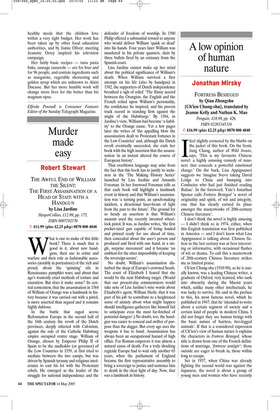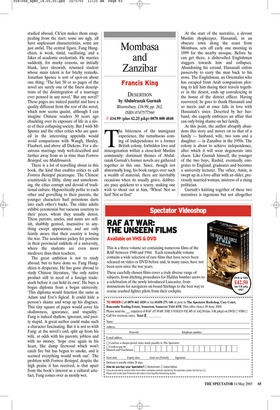A low opinion of human nature
Jonathan Mirsky
FORTRESS BESIEGED by Qian Zhongshu [Ch’ien Chung-shu], translated by Jeanne Kelly and Nathan K. Mao Penguin, £18.99, pp. 426, ISBN 02265345316 ✆ £16.99 (plus £2.25 p&p) 0870 800 4848 Ifeel slightly cornered by the blurbs on the jacket of this book. On the front, Jung Chang, author of Wild Swans, says, ‘This is my favourite Chinese novel: a highly amusing comedy of manners that conceals a powerful emotional charge.’ On the back, Lisa Appignanesi suggests we ‘imagine Svevo taking David Lodge to China and bumping into Confucius who had just finished reading Balzac’. In the foreword, Yale’s Jonathan Spence calls Fortress Besieged ‘a novel of originality and spirit, of wit and integrity, one that has clearly earned its place amongst the masterworks of 20th-century Chinese literature’.
I don’t think the novel is highly amusing — I didn’t think so in 1974, either, when this English translation was first published in America — and I don’t know what Lisa Appignanesi is talking about. Chinese fiction in the last century was at best interesting or informative, with occasional flashes of wit or drama. To call this a masterwork of 20th-century Chinese literature strikes me as limited praise.
Ch’ien Chung-shu (1910-98), as he is usually known, was a leading Chinese writer, a graduate of Oxford, very learned, who sank into obscurity during the Maoist years which, unlike many other intellectuals, he was lucky to survive. He said in the preface to this, his most famous novel, which he published in 1947, that he ‘intended to write about a certain segment of society and a certain kind of people in modern China. I did not forget they are human beings with the basic nature of hairless, two-legged animals’. If that is a considered expression of Ch’ien’s view of human nature it explains the characters in Fortress Besieged, whose title is drawn from one of the French definitions of marriage, ‘fortresse assiégée’: those outside are eager to break in, those within long to escape.
Set in 1937, when China was already fighting the second world war against the Japanese, the novel is about a group of young men and women who have recently studied abroad. Ch’ien makes them unappealing from the start; some are ugly, all have unpleasant characteristics, some are just awful. The central figure, Fang Hungchien, is weak, timid, vacillating, and a faker of academic credentials. He marries suddenly, for murky reasons, an initially blank, later shrewish, returned student whose main talent is for bitchy remarks. Jonathan Spence is sort of spot-on about one thing: ‘The last 50 or so pages of the novel are surely one of the finest descriptions of the disintegration of a marriage ever penned in any novel.’ But any novel? These pages are indeed painful and have a quality different from the rest of the novel, which now seems quaint, although I can imagine Chinese readers 50 years ago chuckling over its exposure of life in a sliver of their collapsing society. But I wish Mr Spence and the other critics who are quoted in the interesting appendix would avoid comparisons with Waugh, Huxley, Flaubert, and above all Dickens. For a disastrous marriage truly well-described and farther away from us in time than Fortress Besieged, see Middlemarch.
There is a lot of travelling about in this book, the kind that enables critics to call Fortress Besieged picaresque. The Chinese countryside is filthy, slimy and unwelcoming, the cities corrupt and devoid of traditional culture. Hypocritically polite to each other and grovelling to their parents, the younger characters hurl poisonous darts into each other’s backs. The older adults exhibit ceremonial but vacuous courtesy to their peers, whom they usually detest. These parents, uncles, and aunts are selfish, shabbily genteel, insensitive to anything except appearance, and are only faintly aware that their country is losing the war. The academics jockey for position in their provincial sinkhole of a university, where the students are even more mediocre than their teachers.
The great ambition is not to study abroad, but to have done so. Fang Hungchien is desperate. He has gone abroad to study Chinese literature, ‘the only native product still in need of a foreign trademark before it can hold its own’. He buys a bogus diploma from a bogus university. ‘This diploma would function the same as Adam and Eve’s figleaf. It could hide a person’s shame and wrap up his disgrace. This tiny square of paper would cover his shallowness, ignorance, and stupidity.’ Fang is indeed shallow, ignorant, and pretty stupid. A great author could make such a character fascinating. But it is not so with Fang: at the novel’s end, split up from his wife, at odds with his parents, jobless and with no money, ‘hope rose again in his heart, like damp firewood which won't catch fire but has begun to smoke, and it seemed everything would work out’. The problem with Fortress Besieged, despite the high praise it has received, is that apart from the book’s interest as a cultural artefact, Fang comes over as mostly wet.



































































 Previous page
Previous page